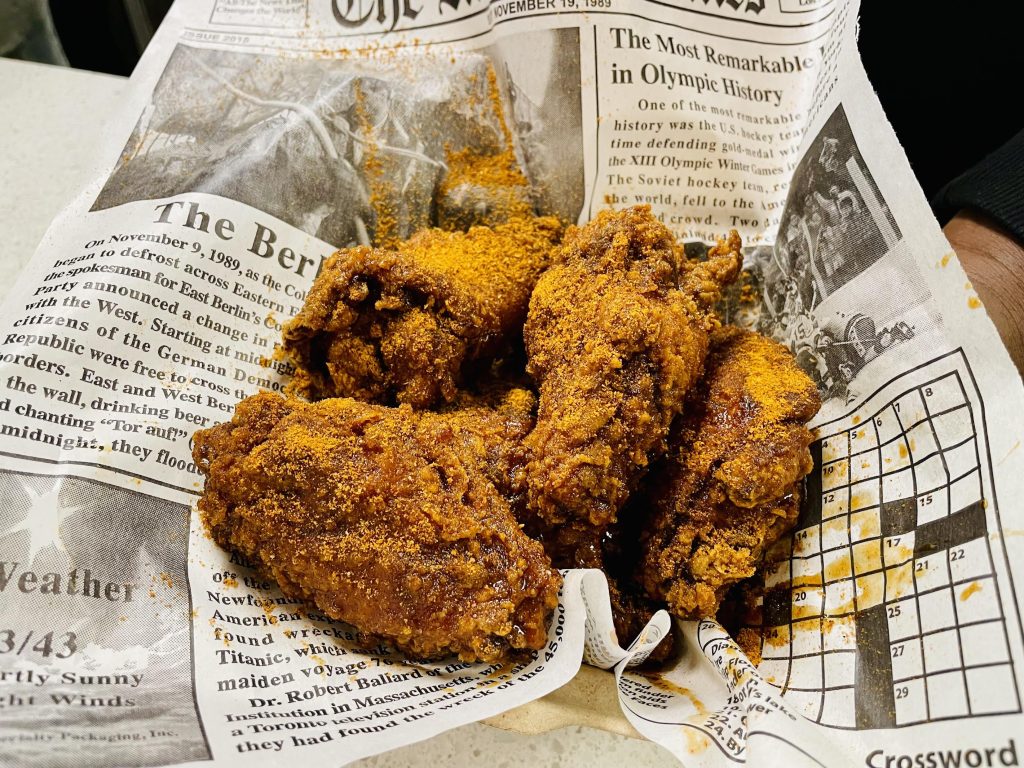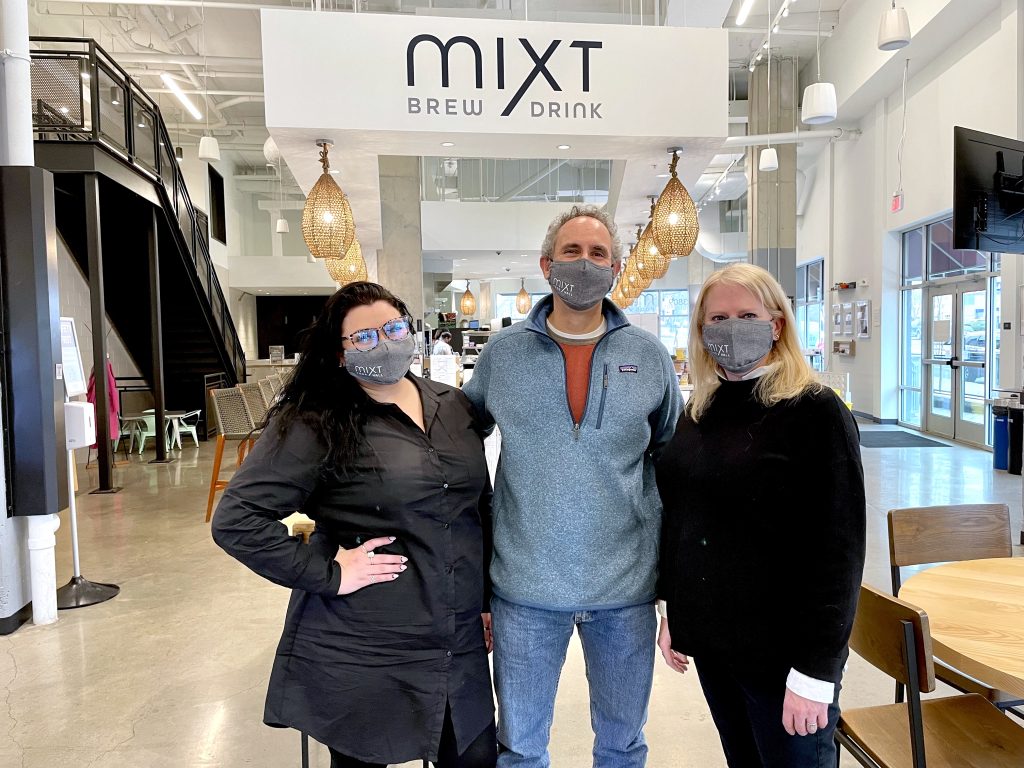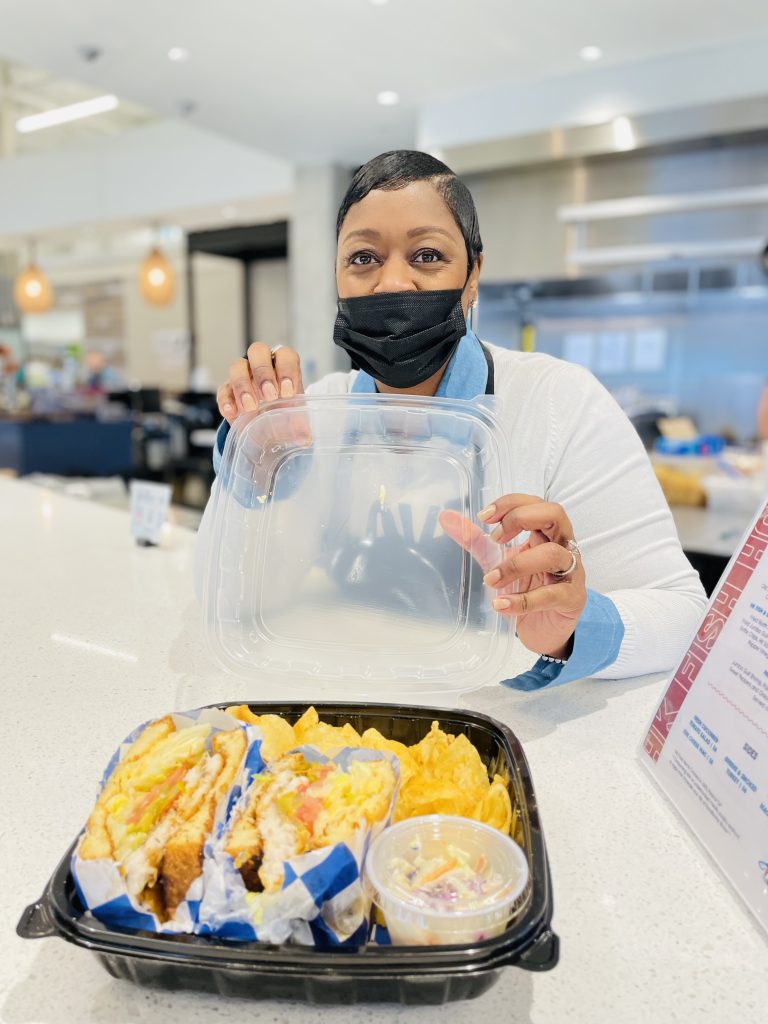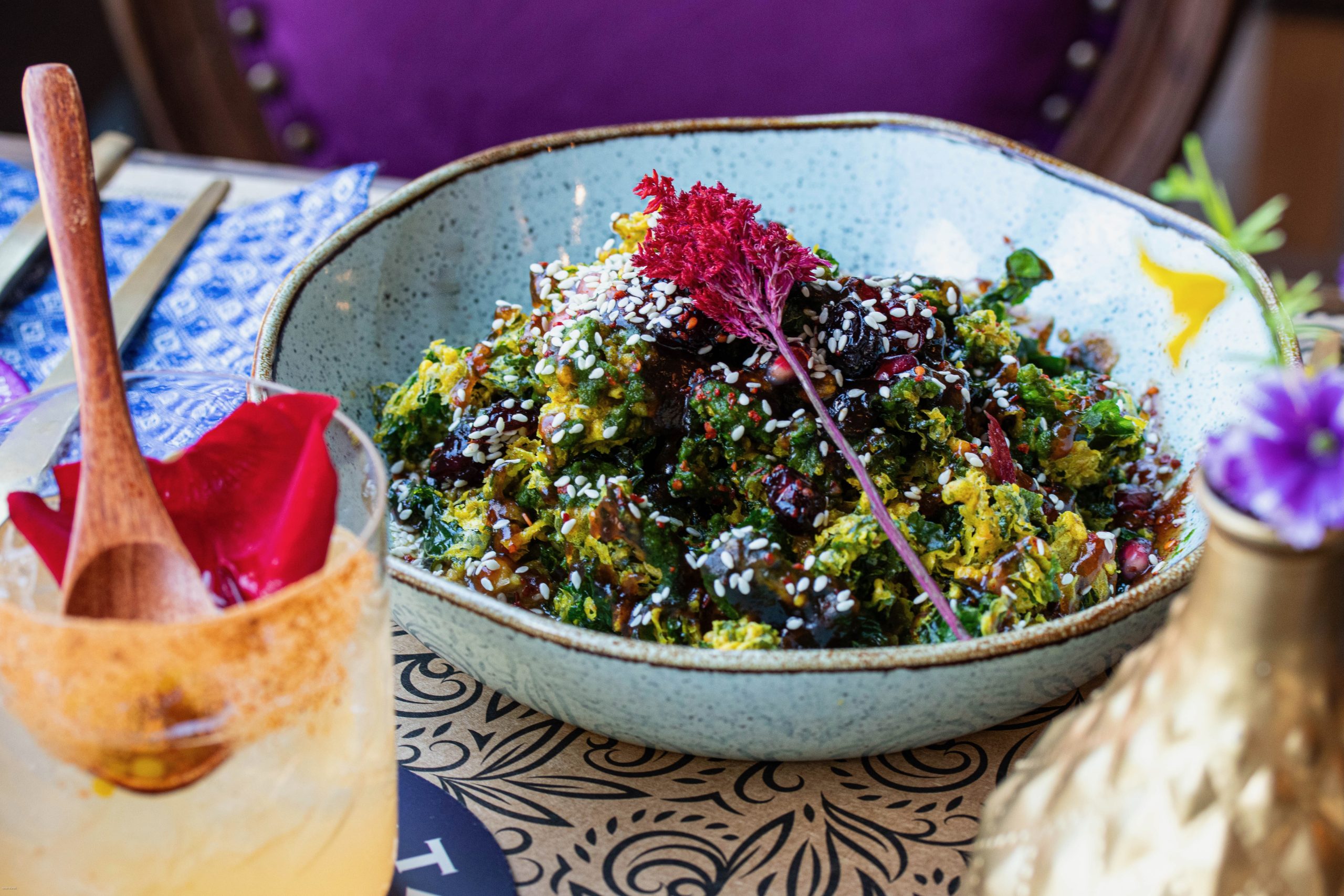When you enter a food hall and are overwhelmed with choices, follow your nose to the best smelling stall. At miXt, just over the D.C. border in Brentwood, your sniffer might send you to Spice Kitchen from Nigerian American Chef Olumide Shokunbi. Almost all the dishes offered, including some sizzling wings, are dusted with a nut-based spice blend from West Africa that typically coats beef skewers called suya.
Shokunbi was raised in Prince George’s County, where miXt is located. Before opening inside the food hall in October 2021, Spice Kitchen did a booming delivery business out of Mess Hall in D.C. Now Shokunbi can interface with customers and talk up his vision of making Spice Kitchen a national West African food brand.
But first, baby steps. “We’re focused on spices and flavors so we can have that authentic feel, but with things that are more familiar,” Shokunbi says. “When people look at our menu, they’re like, ‘I know about salmon, I know about shrimp, I know about all that.’ I compare what we do to Chinese American food. They created stuff like General Tso’s Chicken and slowly and surely, people started trying more native food. I have that same vision for Spice Kitchen. I want more African places to open because of this.”
Shokunbi has experience working for a company that knows about scaling up. He was the general manager of a Chipotle for six years and came away wanting to one day be an employer who empowers his employees by offering them an ownership stake, possibly through profit sharing. “If I make money, you make money,” he says.

Shokunbi is a new face at miXt, but he’s not the only one. The food hall changed hands and names with little fanfare in October 2020. “As this organization group, there was no grand opening,” says Peter Siegel. He is the CEO of Landex Development, which developed the Studio 3807 apartment building that houses miXt, and a co-owner of the food hall. “Right or wrong, I said, ‘Let’s just quietly change this over, keep doing what we’re doing, and be relevant to the world out there.’”
When the first iteration of the 8,500-square-foot venue with 22-foot ceilings and room for about five vendors opened in October 2019 as Savor, it attracted more attention. Not only was it the county’s first food hall, but it was also one of the few Black-owned food halls in the nation.
“Savor was designed to incubate up-and-coming minority food concepts, bring food diversity to the region, be a good neighbor, and prove to the market that Prince George’s County residents were primed for something different,” says founder April Richardson, an attorney and food entrepreneur behind DC Sweet Potato Cake. “And we did just that. People from all over the U.S. traveled to Savor because it was Black woman owned, with the majority of vendors being African American.”
But halfway through Savor’s first year in operation, the COVID-19 pandemic hit. Running a food hall is already onerous because of the tight margins, high turnover, and multiple personalities involved. Now add a public health crisis that necessitates curtailing operations. “I could not come to an agreement with the landlord over rent during the height of COVID,” Richardson says.
After Richardson’s departure, Siegel brought in Sandy Patterson, who is White, as a co-owner and director of operations. Most recently she was the chef manager at Aramark’s LEO | MKT at Georgetown University and she taught at the now closed L’Academie de Cuisine in Montgomery County for 15 years. Patterson chooses which vendors are added and says being BIPOC-owned isn’t a criteria for joining miXt as it was under Savor.
When City Paper visited miXt in late January, Siegel didn’t mention the constraints of the pandemic when asked about the transition from Savor to miXt. Instead, he offered, “We did have an initial operator in here and unfortunately it didn’t work out because they didn’t understand the community.”
Richardson lives in Maryland and owns DC Sweet Potato Cake two miles up the road in Hyattsville. “In Prince George’s County, we are touted as the most affluent area in the U.S. for African Americans,” she says. “This statistic bothers me because we only own our homes and we do not own commercial real estate, which is the actual key to generational wealth.”
“Business owners should be tired of renting because when we rent, the landlord is in control of our destiny and we all learned this during the pandemic, the most vulnerable time to be a commercial tenant,” Richardson adds. “Many of our livelihoods rested on a landlord’s decision of whether we survive or whether we tank and unfortunately, so many landlords allowed businesses to tank even though they accepted government funds to help them stay afloat.”
While Siegel is the CEO of Landex Development, LLC, which received a $93,817 Paycheck Protection Program loan in April 2020, the food hall he co-owns, registered under Gateway Food Hall, LLC, did not apply for a PPP loan or a Restaurant Revitalization Fund grant.
Richardson and Siegel signed a settlement agreement preventing both parties from discussing the fine details of the split. Siegel sent a formal statement about the leadership transition. Studio 3807 is registered and owned by Brentwood Development, LLC.
“As the owner of the property, Brentwood Development, LLC, is grateful for its collaboration with Ms. Richardson, which led to the establishment of an innovative culinary experience,” it reads. “During Ms. Richardson’s time as manager of the property, the food hall saw growth and engagement with the community and with local chefs and artisans. Eventually, Brentwood Development, LLC, and Ms. Richardson agreed to part ways to pursue different goals and opportunities. … We look forward to Ms. Richardson’s future ventures, and miXt Food Hall remains committed to bringing a diverse, equitable and inclusive culinary vision and talent to the community.”
Richardson has plans. First up is 90/10 by DC Sweet Potato Cake coming to 17th and K streets NW this spring. Then, she says, it’s on to a new food hall in Prince George’s County. Richardson named the forthcoming 1921 Food, Art, and Cultural Marketplace after the year of the Tulsa race massacre and is proud to say “she owns the dirt.” Building pipelines to Black ownership in the hospitality industry is a constant drumbeat, and one of the reasons DMV Black Restaurant Week is held each fall.

Like Spice Kitchen, two other Black-owned businesses at miXt have strong missions and expansion plans. Relish Market opened in October 2019 and made it through the transition from Savor to miXt. Stephanie Freeman and her daughter, Alexia Yates, own the wellness-focused market stocked with gourmet goodies. Freeman says she tries to fill the needs of customers who spot recipes in the Sunday paper but give up on making them because they can’t find ingredients like dried lime, nutmeg, saffron, and black garlic.
Relish Market makes juices, teas, soups, and smoothies. Some of the drinks contain a gel made from sea moss that is said to boost the immune system. They can also create private-label juices for the other vendors in miXt and chefs at neighboring stalls can buy her spices by the pound to incorporate into their cooking.
Freeman is best known for her Pepperly Love hot sauce and spice blend line. She got her start selling them at local farmers markets. Relish Market also carries products from more than 16 other local brands. “A lot of them I came up with at farmers markets and was able to reach back to them and bring them in,” she says. Freeman has her sights set on opening multiple locations and likes that, in the Amazon age, people can come in to “touch, feel, and ask questions.”
She describes the transition from Savor to miXt as “kind of hectic and crazy for a while” and “a culture change.” When sales dropped off for her and others in 2020, Freeman was nervous but stuck with it. “Don’t get me wrong, they’re nice enough people,” she says, referring to Siegel and Patterson. “I don’t have any real complaints.”
That said, she says she misses the “jumping bar scene” that Savor boasted and isn’t sure if it dissolved because of the pandemic or some other reason. “It’s not a hangout,” Freeman says. “There’s COVID. But I go to other places and I can barely get in. I just want to see more done about keeping the foot traffic and keeping the vendors here.”

Former pastry chef Rivka Alvial manages miXt Drink, the bar that doubles as a cafe with a full array of coffee and espresso drinks. Her drink menu highlights local spirits and thoughtfully uses symbols to indicate which cocktails and beers go best with each vendor’s cuisine. The bar closes at 8 p.m. Sundays through Tuesdays, 9 p.m. on Wednesdays and Thursdays, and 10 p.m. on Fridays and Saturdays.
Siegel hopes to offer more of a swinging atmosphere for people looking for a place to hang after art shows let out when pandemic conditions improve. Portico Gallery and Studios shares an address with Studio 3807. The neighborhood is part of the Gateway Arts District, where hundreds of artists live and work. That’s why you’ll see murals affixed to pillars inside the food hall as well as local art for sale on the ground level and mezzanine.
“Every single one of us in here wants more business and foot traffic,” Patterson adds. “We were gaining momentum until omicron.”

HK Fish House, which opened in December 2021, is already adding to the vibe. Wafts of pasta jambalaya, Cajun fried shrimp, and the occasional gumbo fill the air when you approach the stall located on the opposite side of the oval that forms the central bar. Co-owner Kimberly VanKline, who has an abundance of experience in catering, doesn’t need much space to wow with big flavor.
After graduating from culinary school in 2007, she became a private chef for big names including Common, Steve Harvey, Karen Huger from The Real Housewives of the Potomac, and former New York Times publisher Arthur Ochs Sulzberger Jr. She also got to show off her grandmother’s mac and cheese recipe on Beat Bobby Flay.
You can order that same mac and cheese at HK Fish House. Pair it with the City Island sandwich with fried whiting, shredded lettuce, beefsteak tomatoes, house-made pickles, cherry peppers, and “HK Boss Sauce” on buttery brioche. It’s the kind of lunch you’d want on a pier. “Our whiting is imported from New York,” VanKline, a native New Yorker, says. “The whiting down here is different. Ours has skin on it.”
In addition to the regular menu, HK Fish House offers Sunday brunch from 11 a.m. to 3 p.m. The H in HK Fish House refers to VanKline’s fiancé and business partner Henry Dudley. “Our goal is to get this solid so it’ll be turnkey and open a whole franchise of them,” VanKline explains. “HK is the umbrella. We’re also thinking of a steak concept and a fresh salad and soup concept.”
VanKline calls miXt a smart concept. “It gives any chef or restaurateur an option to see if an idea will work or won’t work and it’ll teach you how to run a kitchen,” she says. “You have to learn the business. That’s a huge piece. The food is the icing on the cake.”
Siegel and Patterson say they set vendors up for success by providing them with basic cooking equipment, helping with utilities, and using bar and cafe sales to bring in revenue that lets them offer more competitive rents. The goal is for vendors to outgrow their spaces and move on.
“Here’s a way to seed a food desert and create opportunities for small businesses to try out being in a brick and mortar,” Siegel says. Parts of Brentwood and Mount Rainier were once considered food deserts by the U.S. Department of Agriculture’s standards, but that has changed in recent years. “The plan was to have people be here for two or three years so they can build up their sales and have something to take to a bank or to an investor to say, ‘Hey, I’m real.’”
There’s currently one open stall. “It’s important to me that we represent the community and we bring in food that the community wants,” Patterson says. And again, while being BIPOC-owned is no longer necessary, she doesn’t accept just anyone. “A guy from a hospitality group came in and said, ‘I want to open one of our concepts here.’ We said no because that’s not the mission.”
Some vendors who have come through the food hall, either as miXt or Savor, did not respond or declined to comment on their experience, including the owners of Uncaged Chefs, Kenny’s Kale, and Curated DMV.
Chef Mackenzie Kitburi, on the other hand, co-owns Little Miner Taco and talks about his upcoming graduation from the food hall to a brick-and-mortar restaurant. The business he co-owns with Kathy Voss was one of the original Savor tenants in 2019. A story about the restaurant’s beloved birria from Post critic Tim Carman helped make the food hall a draw.
“I saw it as a good opportunity to launch this idea I had for more of a casual, quick-service concept,” Kitburi says. “I saw the neighborhood and thought it had a lot of potential being so close to D.C. but kind of its own little community.”
While the past couple of years have been “a crazy crazy crazy ride,” according to Kitburi, he’s grateful he was able to build up a following. “We’ve outgrown that space for a long time now,” he says. “We’re long overdue to have our own space, but I didn’t want to leave that area.” He’s moving into the former Las Margaritas restaurant across the street in Brentwood, at 4308 Rhode Island Ave. Little Miner Taco will leave miXt and move into its new digs this spring.
“For Peter, it’s his first introduction into the food and beverage industry, so it comes with some learning curves,” Kitburi says, reflecting on his experience at Savor and miXt. “I believe his heart is in the right place. I have no complaints because with the opportunity we were given, we were able to make the most out of it.”




